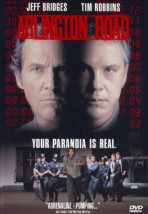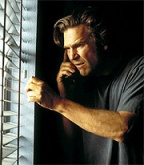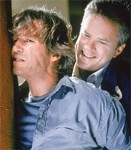|
|
||
 |
USA,
1999. Rated R. 117 minutes.
Cast: Jeff Bridges, Tim Robbins,
Joan Cusack, Hope Davis, Robert Gossett, Mason Gamble, Spencer Treat
Clark, Stanley Anderson |
|
| Grade: C- | Review by Dana Knowles |
|
|
||
 |
USA,
1999. Rated R. 117 minutes.
Cast: Jeff Bridges, Tim Robbins,
Joan Cusack, Hope Davis, Robert Gossett, Mason Gamble, Spencer Treat
Clark, Stanley Anderson |
|
| Grade: C- | Review by Dana Knowles |
Plot Synopsis: History Professor Michael Faraday (Jeff Bridges) is a widower with academic expertise in terrorism, a depressed and lonely nine-year-old son, a former student for a lover (Hope Davis), and--across the street from his suburban home--the Lang clan (Tim Robbins, Joan Cusack, and assorted children), a family that epitomizes normalcy... or DO they?! When his suspicions are raised by what appears to be a discrepancy in Oliver Lang's (Robbins) story about his background, Faraday becomes obsessed with digging up the truth. Might it be possible that this modern-day Ward and June Cleaver are actually terrorists? It might!
![]() s
disturbing as the issue of domestic terrorism may be,
s
disturbing as the issue of domestic terrorism may be,  there's
something even more disturbing about struggling to write about a thriller that
deals with that topic because you can't stop giggling long enough to type. Arlington
Road has many things going for it... a wonderful cast, a compelling subject,
an interesting premise, and a healthy skepticism toward and paranoia about the
placidly wholesome façade of suburbia. What it does not have is a firm
grasp on theme or tone or anything else that would make it an effective or thought-provoking
thriller. Instead, it's a bizarrely overwrought fever dream of a movie... hilariously
over-the-top, even as it presents its intended-to-be-sobering paranoid vision
of the dangers that cloak themselves in the guise of ordinary life.
there's
something even more disturbing about struggling to write about a thriller that
deals with that topic because you can't stop giggling long enough to type. Arlington
Road has many things going for it... a wonderful cast, a compelling subject,
an interesting premise, and a healthy skepticism toward and paranoia about the
placidly wholesome façade of suburbia. What it does not have is a firm
grasp on theme or tone or anything else that would make it an effective or thought-provoking
thriller. Instead, it's a bizarrely overwrought fever dream of a movie... hilariously
over-the-top, even as it presents its intended-to-be-sobering paranoid vision
of the dangers that cloak themselves in the guise of ordinary life.
Director Mark Pellington is never content to build suspense the old fashioned
way. Rather than let disturbing facts or details sneak up on us and turn our
assumptions on their heads, he hammers his points home, then emphasizes them
further with jarring cuts or close-ups, then underlines them again with musical
cues that are--I kid you not--on the order of dunh-dunh-duhhhhhh. Though Angelo
Badalamenti's score has occasional moments of inspired eeriness (over the opening
shot in particular), Pellington seems to have ordered him to eschew all attempts
at counter-point or irony, as if the audience might miss just how shocking each
shocking moment truly is without an aural assist. At times, the dramatic emphasis
is laid on so thick that you fear for the health and welfare of his cast. It
must have been a painful shoot for Jeff Bridges, who spends the majority of
his screen time with a look of profound shock or alarm on his face, all driven
home in extreme close-ups, in case the audience isn't quite sure how Faraday
feels about what he's just seen or discovered or realized. There must be fifty
such shots... maybe even double that. I can't recall when I've ever felt so
much more concern for the actor than for the character he was playing, particularly
while watching a thriller. 
There are hints that the ludicrousness of this entire enterprise is deliberate... as if Pellington is doing to the Hollywood thriller what Sam Raimi did to the exploitation horror film with Evil Dead II. Robbins and Cusack appear to intentionally infuse their performances with quirky humor, and Pellington's view of this suburban haven is cockeyed in a way that can't be accidental. But the inclusion of such serious events (or rather parallels to same) as the Oklahoma City bombing and the Ruby Ridge shootings seems to beg us to consider this story an earnest attempt to examine the lurking threat of the disenfranchised among us, and the terrible price we may pay for ignoring their desperation and rage. It's impossible to reconcile the giggle-inducing style of Pellington's direction with the real issues the film addresses and come up with a coherent take on his intent. Though the conclusion of the film makes an almost-successful grab at pulling the incongruities together into a satisfying whole, any thoughtful reflection on what you've seen will reveal more plot holes and questions and concerns than can reasonably be laid to rest. Plus, once you've laughed inappropriately, it's impossible to take it back.
The script is heavy on set-up and very, very light on development. From the premise, it's reasonable to assume that by making Faraday a history professor who specializes in the subject of terrorism, screenwriter Ehren Kruger allows for his protagonist to have the sort of special knowledge or insight that will both raise his suspicions and aid in his investigation. Wrong. Faraday may as well have been a professor of Renaissance poetry for all the good his background does him. A linkage is never made, except to the degree that his lectures to his students give us a window on his ever-expanding bitterness and paranoia. Because his professional expertise is never used, the coincidence feels like an unnecessary conceit. And though it could be argued that somewhat relevant linkages are ultimately made, they're not sufficiently clever or useful to overcome the sense that this aspect of Faraday's character is nothing but wasted potential, left egregiously un-mined by a lazy screenwriter.
|
The Big Picture |
|
| Carlo |
|
| Alison |
|
| Kris |
|
| Jen |
|
| Dana |
|
| Jeff |
|
Though I think the entire film is a misfire, I admit that--in retrospect--its cheesiness has some genuine appeal. I think a second screening would be more entertaining than the first, if only because I could willfully relax and enjoy the ridiculously overblown narrative approach instead of cringing on behalf of the talented cast and crew whose work is being undermined with the directorial equivalent of a sledgehammer. Pellington never modulates his storytelling. Every scene is staged to be a climax, and every moment is bled for maximum dramatic impact. That this approach might achieve the opposite of its intended effect never seems to occur to Pellington. By insisting (and I mean INSISTING!) that we are relentlessly immersed in high drama, he deflates the power of each successive image and incident, leaving the audience with little choice but to escalate its snickering as the movie escalates its action and suspense.
For all his frantic efforts, Pellington fails to generate the sort of nagging paranoia that is served up with such resonant precision by The Parallax View, or Three Days of the Condor, or other notable thrillers that seek to touch a political nerve. The film that really seems to have inspired this exercise is from another genre altogether. I was reminded most of Rosemary's Baby, which also addresses the so-nice-they're-creepy-neighbors syndrome, as well as the conspiracy-in-unlikely-places syndrome, plus the is-it-paranoia-or-is-it-really-a-threat syndrome, and the unsafe-in-your-own-home syndrome. Unfortunately, Pellington's occasional use of the surreal is more confusing than expressive, and he's too clueless to know that a slow build to a disturbing payoff is much scarier than a succession of in-your-face "shocking" revelations. When all is said and done, the most disturbing thing about this film is not that it elicits contemplation about the threat of domestic terrorism, but rather that it invites speculation about why so many people pay big money to live in these sorts of sterile suburban communities. That... and Tim Robbins' haircut, which is just about as scary as they come.
Review © July 1999
by AboutFilm.Com and the author.
Images © 1999 Columbia TriStar Interactive. All rights reserved.
 |
|